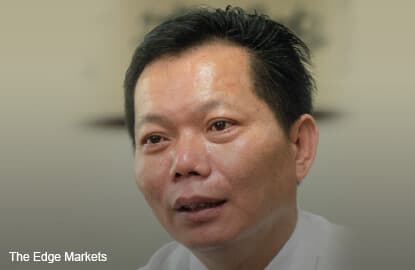
INMAX Holding Co Ltd, a Taiwan-listed manufacturer of industrial nails and staples and pneumatic nailers and staplers with operations in Malaysia, is seeing rising demand for its products from the US property market and the Malaysian furniture market.
According to Inmax president Datuk Allen Chiang Wen-chou, the company has been producing pneumatic nailers and staplers for the last 25 years and demand remains strong as there are no substitute products in the market.
“The US is our largest market because the Americans build their homes with wood, and that consumes a large volume of nails and staples. And furniture makers in Malaysia still rely very much on our products because not even glue can replace them,” he tells The Edge in a recent interview.
Based in Seremban, Negeri Sembilan, Inmax is the largest producer of pneumatic nailers and staplers, as well as industrial nails and staples, in Southeast Asia. It has a monthly production capacity of 5,000 tonnes and an annual production capacity of 60,000 tonnes when its three plants are running at full throttle.
Founded in 1990, Inmax Sdn Bhd is the Malaysian pioneer in the manufacturing of a full range of fasteners, such as wire collated coil nails, coil roofing nails, plastic and paper tape collated strip nails, brads and staples.
Chiang remains optimistic over the industry’s prospects as global demand for fasteners is on the rise. Hence, Inmax will continue to expand its business and enhance its automation systems.
“When I first started, local furniture makers did not use pneumatic nailers and staplers, but now they use them a lot. In fact, most Malaysian furniture companies are using our products today, and if they continue to do well, we will ride the wave,” he says.
Incorporated in Cayman Islands, Inmax operates two subsidiaries in Malaysia, namely Inmax Sdn Bhd (Inmax SB) and Inmax Industries Sdn Bhd. Year to date, Inmax’s share price has risen 31.95% to close at TWD33.45, giving it a market capitalisation of TWD1.008 billion.
A search with the Companies Commission of Malaysia reveals that Inmax Industries posted a net profit of RM7.02 million in the financial year ended Dec 31, 2015 (FY2015), on revenue of RM30.07 million. Inmax SB, however, reported a net loss of RM222,081 in FY2015, on revenue of RM39.46 million.
Chiang explains that Inmax Industries was set up in 2012 to serve the US market while Inmax SB focuses on the Malaysian market. Going forward, Inmax intends to establish a direct presence in the US by weaving a wide distribution network in the country.
“We plan to put up a manufacturing plant in the US, but it has to be automated. We are still at the planning stage and we hope to go there in the next three years,” he says.
Chiang stresses that Inmax will not go head-to-head with American firms by building a huge production capacity, but will focus instead on branding.
“We will not fight for volume, because no matter how fast you build up your capacity, you will still be a small player in the US. Why? That’s because 20 to 30 years ago, the large American corporations had already started this business on a large scale. If your plan is to put up a huge plant on a big plot of land, you are digging your own grave,” he says.
Chiang recalls that he initially tried to establish the business in Indonesia but it did not work out due to the language barrier. Subsequently, Tan Sri Rafidah Aziz, the then Minister of International Trade and Industry, visited Taiwan and persuaded its businessmen to invest in Malaysia. Chiang was one of the many who was sold on Malaysia.
“When I first came to Malaysia, there were no direct flights, so, we had to take a connecting flight in Hong Kong. I still remember that the tallest building in Malaysia was Menara Maybank,” he says.
Eventually, Chiang became the first Taiwanese businessman to set up a manufacturing plant in Seremban. The rest, as they say, is history.
Chiang is also the honorary president of the Taipei Investors’ Association in Malaysia, as well as commissioner of Taiwan’s Overseas Community Affairs Council.
He says that over the years, Malaysia has been able to attract Taiwanese businessmen mainly due to the local Chinese population. Besides, Malaysia has a well-educated population and shares certain similarities with Taiwan in terms of the Chinese language, culture and traditions.
“Malaysia, with no natural disasters, is the best country to serve as our Asean hub and operating centre. There is no time difference with Taiwan. The rental rates in the cities are relatively cheaper than those in Jakarta, Bangkok and Ho Chi Minh City,” Chiang says.
The only shortcoming, he says, is that the Malaysian population is not big enough to supply manpower and, hence, must rely on foreign labour. Therefore, manufacturers would do well to automate their processes, he concludes.
Save by subscribing to us for your print and/or digital copy.
P/S: The Edge is also available on Apple's AppStore and Androids' Google Play.